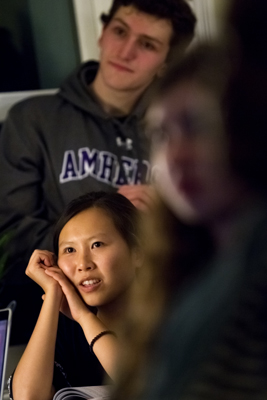October 24, 2014
By Madeline Ruoff ’18

A recent Jazz@Schwemm’s performance
In 2007, then-senior Alex Rodriguez was determined to bring more visibility to jazz at Amherst. With the help of Bruce Diehl, senior lecturer in music and director of jazz performance, and Dominic Poccia, Rufus Tyler Lincoln Professor of Biology, he created Jazz@Schwemm’s, now in its eighth year. The month-long series brings jazz professionals to perform alongside student musicians at Schwemm’s Coffee House. This semester, performances take place at 9 p.m. on Wednesdays in October.
Jazz@Schwemm’s, as Poccia describes it, is “a place where people can come to listen to music without an agenda.” As he sees it, “arts should be part of the atmosphere on campus, not just saved for special occasions.” Schwemm’s concerts provide an outlet for students to showcase their work and to increase the presence of the arts on campus.

Students take in the scene
Poccia says that Jazz@Schwemm’s “creates an interface for people other than instructors to talk about music.” Many of the professional groups feature adjunct faculty, which is, according to Diehl, “a nice way for professors to connect with students.”
These concerts are tremendously beneficial for student performers. “The kind of music [jazz musicians] do is learned by apprenticeship,” Poccia says. “It’s hard for students to get the courage for improvisation, and with Schwemm’s, students are encouraged to jump off the diving board and do it.” Diehl describes Jazz@Schwemm’s as a “test run for final performances.”
Jazz@Schwemm’s also increases students’ exposure to various styles of music. “It’s pleasant to see how student react to the different types of music brought in. Performers just bring their groups and play what they want to play, so there are always surprises,” says Diehl. In addition, the program shows students that there’s an active art and jazz scene in the local community.
Poccia and Diehl are both grateful to all those who make Jazz@Schwemm’s possible, feeling it fills a vital niche on campus. Poccia emphasizes the benefits of student exposure to the arts: “Jazz could end up being the most important evocation in their lives. When something gets under their skin, they can never get away from it.”
For Diehl, Jazz@Schwemm’s is “pure ear-candy. It’s two hours of every week that go into just listening to music. I’m [at Schwemm’s] ’til midnight, but it’s been a wonderful evening, so I don’t mind.”